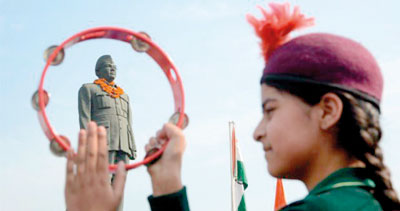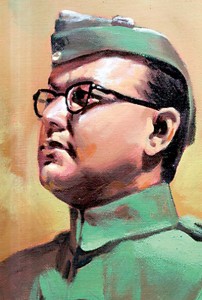Sunday Times 2
Chandra Bose Files: What’s PM Modi afraid of?
India’s national hero defied Mahatma Gandhi, met Adolf Hitler, and raised an army to force the British out of India. Yet despite promises by India’s new prime minister to open the archives, Bose’s fate remains a mystery
To the British he was a traitor who joined hands with Adolf Hitler. To the German Nazis he was an enemy of an enemy, hence a friend. To Indians he was a nationalist political leader and freedom hero who trained an army to oust the British colonial rulers from South Asia.

The BJP-led government has refused to make public nearly 39 classified files on the mysterious disappearance of Netaji Subhas Chandra Bose. (Photo: AFP)
But the eventual fate of Subhas Chandra Bose, who collaborated with Germany and Japan against the British in World War II, remains a mystery and a subject of continuous debate in India to this day – partly because 39 files on him are hidden away in government archives.
Some believe that Mr. Bose died in a plane crash in Taiwan shortly after the Japanese surrender in August 1945. Others say he came back to India as a Hindu monk or that he was locked up in solitary confinement in Siberia. An official government probe in 2006 concluded that Bose did not die in a plane crash and that his supposed ashes in Tokyo, often visited by Indian leaders on trips to Japan, are not his.
During national elections last spring, Prime Minister Modi’s Bharatiya Janata Party (BJP) criticized the previous administration for not disclosing the documents related to Bose’s death. If their party was elected, BJP officials vowed, they would declassify the Bose material.
Yet after a half year in power, the BJP has taken a U-turn and now refuses to disclose secrets related to Bose’s disappearance. The position is similar to that of the previous Congress-led government. Mr. Modi’s press officers say that making the files public would “prejudicially affect relations with foreign countries.”
Most of the 39 Bose files are known to relate to phases of India’s freedom movement and of communication between Indian leaders during that time. Two of the files concern official correspondence with, and about, his widow and daughter. One deals with Bose’s alleged remains, kept in the Renkoji Temple in Japan on behalf of Indian government. Most files relate to Bose’s disappearance.

Subash Chandra Bose
“We’re asking files to be declassified so that we know the truth behind our freedom hero’s death,” said Anuj Dhar, author of “India’s Biggest Cover-up,” a book about Bose’s death. Mr. Dhar alleges that the government is protecting prominent Indian political leaders of that period who knew the details of his disappearance. “If the BJP government doesn’t release secret files it runs the risk of filling the boots of the Congress [Party] as the main villain in the story.”
After 60 years and several commissions of inquiry, the Indian government still has not produced any conclusive findings, at least not publicly. The most recent investigation, headed by former Supreme Court judge M. K. Mukherjee, concluded in 2006 that Bose “is dead” but “did not die in the plane crash, as alleged.” The Mukherjee Commission argued for a probe into whether the plane crash rumor was a cover to help Bose escape to Russia. Its findings were rejected by the government.
Interested groups and Bose family members want the files declassified. Bose’s great grandson, Chandra Bose, told Indian TV that, “the government says that if it releases files related to Bose that will harm India’s ties with foreign countries. We need to know what exactly does it mean. Does it mean that there was an international conspiracy to kill Bose?” He went on, “It has become imperative for us to know what really happened to our freedom hero.”
Part of Bose’s legend and mystique is due to his escapades. The British-educated one-time leader of the Congress party rejected Mahatma Gandhi’s non-violent movement in favor of an armed uprising, and he dabbled in fascist thinking. In 1941, he escaped his Calcutta home despite efforts by British police to catch him. Taking a treacherous route through Afghanistan, he reached Germany where he met Hitler. The Nazi leader advised Bose to seek help from the advancing Japanese troops in Asia and offered him passage to Tokyo aboard a German submarine.
From Japan he arrived in Burma at the head of an 80,000-strong Indian force. After his army was forced to surrender to the British in August 1945, Bose disappeared. He was last seen at an airport in Taiwan’s Taihoku airport. At that point in the official story, his trail went cold.
Courtesy The Christian Science Monitor

